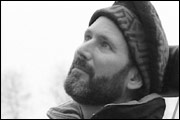In memoriam: Philip Simmons (1957-2002)
A tribute to Philip Simmons by his editor at UU World.
Years ago, as editor of this magazine, I got a cold call from Simmons. He wondered if I'd look at some essays of his, based on sermons he had given at his church. Few sermons, even good ones, work in print--they tend to be more loosely strung together than readers tolerate. But I gave my stock answer: "Sure, send them in."
To my surprise, the essays Simmons sent were tightly constructed--also funny, self-effacing, beautifully written, and profound. Over the years, we ended up printing nearly a dozen. They spoke of everyday life in everyday language and images, often drawn from the White Mountains, where Simmons had lived part-time as a boy and where he had gone to live full-time after his affliction ended his career as an English professor.
Of course, everyday life, as Simmons saw it, always had death looming in the background, and many of his essays applied the wisdom of world religions (along with the wisdom of philosophers, poets, physicists, farmers) to the problem of living with death and loss. Simmons, no professional religion scholar, nonetheless had the rare gift of cutting to the heart of other people's faiths, thus avoiding the shallow eclecticism that plagues so many writers in his subgenre--the personal religious exploration.
Nor was he in the business of dispensing spiritual advice. He poked fun at writing that presumes to tell us "the six ways to find a mate, the eight ways to bring greater joy into your life . . . the twelve steps toward spiritual enlightenment." In his own work he simply shares his story, his perceptions, his best thoughts, in the hope we can glean something useful from them.
Ultimately, and naturally, Simmons wanted to collect his essays in a book. After searching several years for a publisher, he decided to self-publish Learning to Fall: The Blessings of an Imperfect Life, which I had the pleasure of editing. (And it was a pleasure. Simmons always listened carefully to editorial advice and always responded thoughtfully to it, even when he didn't take it.)
The self-published edition of Learning to Fall sold some 3,000 copies before it was picked up and republished by Bantam. In June 2001, I visited Simmons in New Hampshire, right after he received the good news from Bantam, and he told me they had asked him for some newly written essays to add to the book. He had refused, he informed me with a sort of defiant cheerfulness: The new essays were intended for his second collection.
I don't think he finished writing that second collection, but he did live to see the first collection favorably reviewed in places like Booklist and the New York Times. He also lived well beyond the four or five years he'd been given by his doctors. He died ten years after his diagnosis, on July 27, 2002, "after a time of quiet with Kathryn [Fields, his wife,] and others in his family," according to an e-mail message Fields sent to friends.
Most of us would like to think that when our time nears we will face death with humor and courage. Philip Simmons did that and something more: He turned his death into a gift for his readers, and in this way he transcended death.








